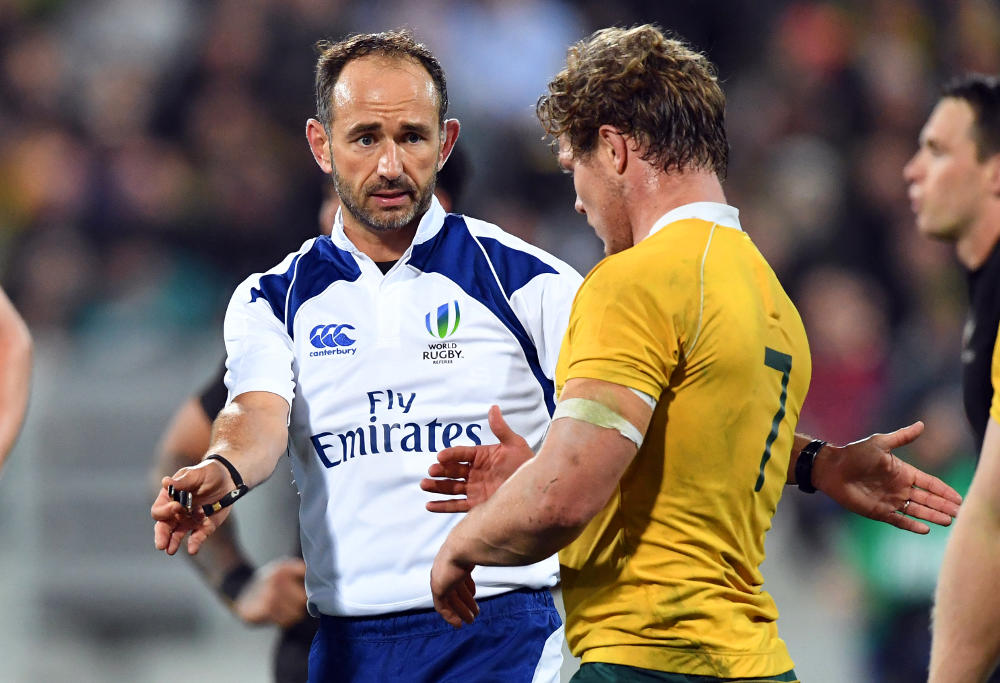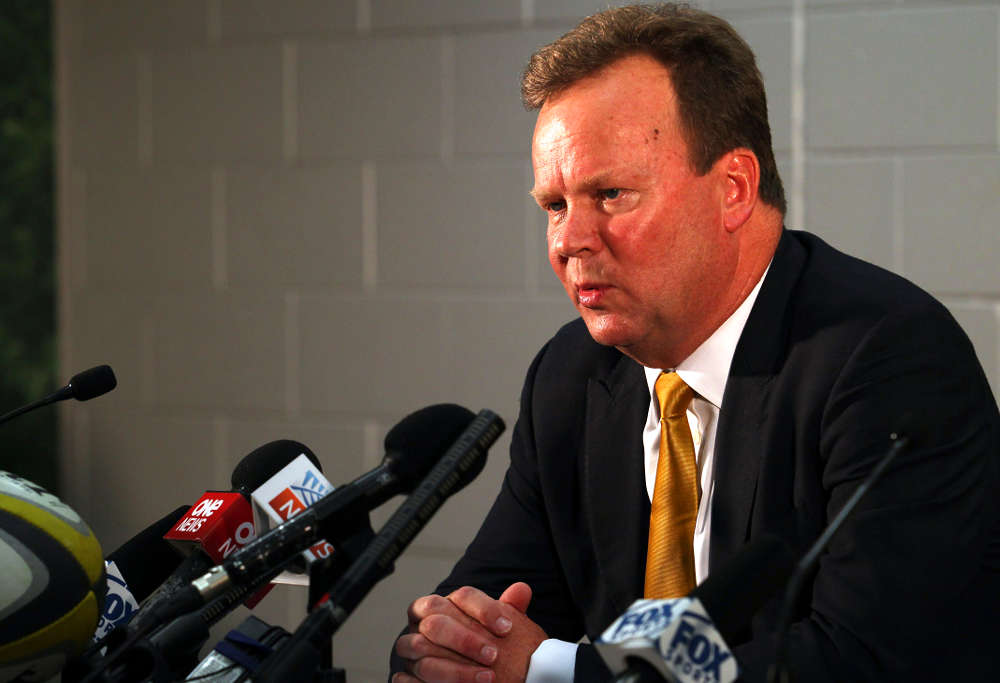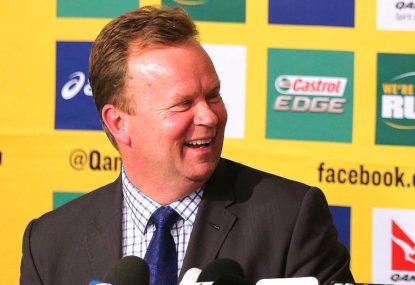World Rugby has just finished its third Rugby Conference and Exhibition (ConflEx) in London. The overall theme of the ConflEx, according to World Rugby, the governing body of the game, was that rugby “continues to experience record participation and fan growth.”
A statement issued by World Rugby noted that the conference focussed on the values of rugby with “integrity, respect and discipline” being major elements of the game’s aspirational values.
There was a “fascinating discussion” on the image of the game and, specifically, the matter of abuse of match officials.
Two Rugby World Cup final referees, Nigel Owens (2015) and Alain Rolland (2007) gave their views. There was evidence that abuse of referees is rising, they suggested. And that this must be reversed by all the stakeholders, “referees, unions, coaches and players,” to ensure the role of match officials is respected.
Nigel Owens was one of the referees identified by the Wallabies coach Michael Cheika in his infamous spray against match officials after the Wellington Test against the All Blacks.
I said at the time that Cheika had gone rogue and that he needed to be brought into line. There was the matter of bringing the game and the Wallabies into disrepute that was at issue.
Also, there was the practical matter that referees are human beings (believe it or not), with feelings. It makes no sense to abuse the officials who control the destiny of your team with their rulings on the complex laws of rugby.
Judging by Michael Cheika’s correct behaviour in the coaching box during the Grand Slam tour someone has got to him. Is this the influence of Mick Byrne? Who knows. What is obvious is that Cheika, finally, is presenting himself as a civilised, composed coach, behaviour he should have adopted from the beginning of his stint with the Wallabies.
Let us hope that this self-discipline remains with Cheika throughout his career with the Wallabies.

In his wrap-up of ConflEx, World Rugby’s chief executive Brett Gosper summed up the state of the union in these words: “Player welfare is our number-one priority and with the initiatives that we are driving, I can say that the game has never been safer than it is today. On top of that the game is growing all over the world, especially as regards women and girls’ participation. Through the success of Rio 2016, rugby sevens is now a phenomenon around the world and the game as a whole has a global fan-base in excess of 300 million people.”
One of the speakers at a session on the women’s rugby and its terrific expansion in recent years was the chief executive of the ARU, Bill Pulver.
We don’t know what Pulver told the conference because (to the best of my knowledge) the ARU hasn’t issued a statement on his discussion. Presumably, Pulver ran through the decisions that were made to create the Pearls, the Australian Women’s Sevens Rugby team that won the first ever Olympic gold medal for women’s rugby at Rio.
This wonderful team, which was full of charismatic players drawn from a number of different sports, has captured the imagination (and rightly so) of Australian sports lovers, irrespective of what sporting code they follow.
The ARU board and Pulver deserve a lot of credit for the creation and development of the Australian Women’s Sevens champion side.
But …
When I was school teacher I remember teaching a high school class on Shakespeare’s sonnets. One strapping lad, the son of a farmer, was gazing out the window totally oblivious to my teaching.
“Rory,” I told him, “this stuff could come up in the exams.”
“Poetry doesn’t milk the cows, Sir,” he told me.
This was a great reply. It deserves to become a Law of Life that can be applied to so many situations to make sense of their implications.
It is certainly applicable to the ARU and its management of the rugby game in Australia.
The hard fact is that the success of the Women’s Sevens program is a fine thing. But in the great scheme of things in Australian rugby it is a niche achievement. It does very little to compensate for the overall mismanagement of the rugby game in Australia in recent years.
The Pearls success isn’t the cash cow the rugby game needs in Australia. It is actually a lost leader. It costs far more money than it can ever bring into the coffers of Australian rugby.
In the vital areas of Australian rugby, the ARU board and its chief executive Bill Pulver are presiding over a declining game.
Player participation of males is declining, the spread of the game is declining, ratings are declining, crowds are declining, interest is declining, the Super Rugby teams are not performing anywhere near expectation, the franchises are in crisis, there are scandals in some of the franchises, the Wallabies have lost a record number of Tests in a year, and on a Grand Slam tour the supporters of the Wallabies can’t even watch them on free-to-air television coverage.
The worst aspect of all of this is that the ARU board and management has lost the confidence and respect of grassroots rugby throughout Australia.
Earlier this month, the ARU meet with a group of disenchanted grassroots rugby supporters to discuss “the strategic direction of Australian Rugby at the grassroots and community level.”
The meeting was co-chaired by ARU chairman Cameron Clyne and the former Wallaby, Simon Poidevin.
The main outcome of the meeting, according to the ARU’s media release, was that the ARU would “review its current strategic plan.”
The review will start “early in the New Year.”
According to Poidevin, “everyone agreed for the conversation to continue.”
How effective will that conversation be, though, in changing the mind of the ARU to stop its attacks on grassroots rugby through its taxes/levies on participants?
And will the conversation encourage the ARU to rescind its policy of withholding funds to clubs and the traditional rugby schools?
In my opinion, the answer to these question is, “no.” And here is why.
There was an ominous sentence in the media release that reads: “It is important to note that there were many months of consultation committed to forming the initial strategic plan and every level of the game was engaged in the process, including fans.”
This sentence should be read as a putdown to the grassroots rugby lobby. It sets out a case that the grassroots concerns have already been considered, and rejected.
And to ram the point that the ARU isn’t really interested in as dialogue with the rugby community on this matter, the media release ended with the following sentence: “No further comment will be made regarding the meeting.”
In my opinion, it is very clear that the ARU board has no intention of making the necessary reforms, to itself and to its policies to restore democracy to the governance of Australian rugby.

The Green and Gold website reported the day after the media release was put out, in an article headed EXCLUSIVE: The Truth behind the ARU’s ‘Key Constituents’ Meeting: “Green and Gold can exclusively reveal that not only was this not a comprehensive set of constituents, but that the output of the meeting – a review of the strategic plan – had already been decided upon at a meeting of the Super Rugby CEOs a week earlier.”
So the ARU did not meet with the key constituents of the grassroots revolt.
And, more importantly, the decision to continue the process of protecting the interests of the Super Rugby franchises and their dominance of the ARU board had been settled, it seems, before the meeting was held.
The truth of the matter is that the ARU board is totally unrepresentative of the broad interests of all the stakeholders of Australian Rugby.
There is more expertise and passion for gender politics on the ARU board than there is for grassroots rugby, for instance.
The ARU board has been captured by a group of insiders who use their position to promote their careers, in and out of rugby.
The insiders do favours for themselves within the Super Rugby franchises and the ARU, whether they be former Wallabies, mates going back to school days or business mates.
They promote themselves to positions within the ARU and Super Rugby franchises where they can repay the favour (even when they or their mates are manifestly unqualified for the job) or get rid of those people in the power structures of the rugby game whose interests do not align with theirs.
And if people within the rugby community – but not the favoured group – make protestations about the direction the game is being taken, about inappropriate staff and board appointments, these people are dismissed as the equivalent of deplorables who will “piss away” the ARU’s money if given access to it.
Sometimes really heavy-handed tactics are used to silence or stifle any criticism, dissent or even fair comment.
Every rugby journalist worth their name can recite horror stories that exemplify the truth of all of this.
Take this example.
A year or so ago, I suggested that a competent ARU official was not an appropriate person to send to a World Rugby conference on the Laws of Rugby. The New Zealand Rugby Union sent Steve Hansen. Hansen, I pointed out, exercised more influence at the conference than the ARU’s spokesperson did.
I argued that this was a bad outcome for Australian rugby.
A former and well-respected Wallaby who was a relative of the official (an innocent party I hasten to add) rang me up and told me he wanted to “smash” me. His anger was clearly intended to intimidate me. But what really shocked me was the fact that this former Wallably felt that he had the right, the entitlement, to act like a thug.
Since rugby became a professional game in 1996, I have experienced many instances of this sort of private intimidation. These include threats of defamation action, racial slurs, vicious emails and the withdrawal of access privileges.
I hope I am wrong about the ARU board being dysfunctional and its membership being inappropriate representatives of the real interests of rugby in Australia.
A test will come early next year when they consider how to deal with the challenge to their business/strategic review that has been unleashed by the grassroots of rugby in Australia.
I am not hopeful, though, that the current board can rise to the challenge of turning around the decline of Australian rugby, or whether it is even capable of understanding that a decline is taking place.
We shall see.































































































